Key takeaways
- Rap music combines storytelling with rhythm and emotion, demanding attention and respect for its craft.
- Kendrick Lamar’s work influences listeners through authentic exploration of themes like identity, struggle, and hope.
- Creating music involves embracing vulnerability and complexity, shifting between personal truths and broader social issues.
- Authenticity in artistic expression is crucial; overcoming challenges leads to deeper connections with one’s own voice and stories.
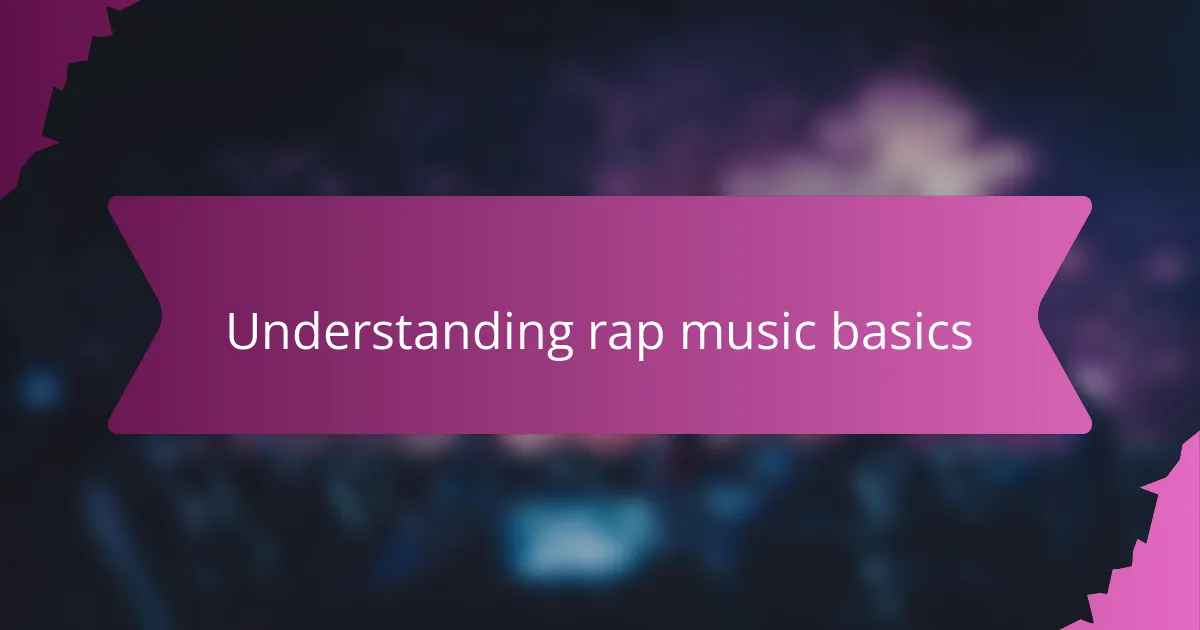
Understanding rap music basics
Rap music, at its core, is a form of storytelling wrapped in rhythm and rhyme. When I first listened closely, I realized it’s not just words over a beat—it’s a powerful way to express emotions and experiences that sometimes feel too complex to say out loud. Have you ever noticed how a single verse can paint a vivid picture or evoke a deep feeling? That’s the beauty of rap.
Understanding rap also means appreciating its flow—the way an artist rides the beat with their voice, pausing and speeding up, almost like a musical conversation. I remember trying to catch every syllable in a Kendrick Lamar track, and it felt like deciphering a code crafted with intention and emotion. It made me realize that rap demands both attention and respect for its craft.
Finally, rap is rooted in cultural history and personal truth. It’s raw, honest, and often challenging, pushing listeners to think differently. Have you ever felt moved by a song that seems to speak directly to your struggles or dreams? That connection is what makes rap music uniquely powerful and why it resonated with me so deeply.
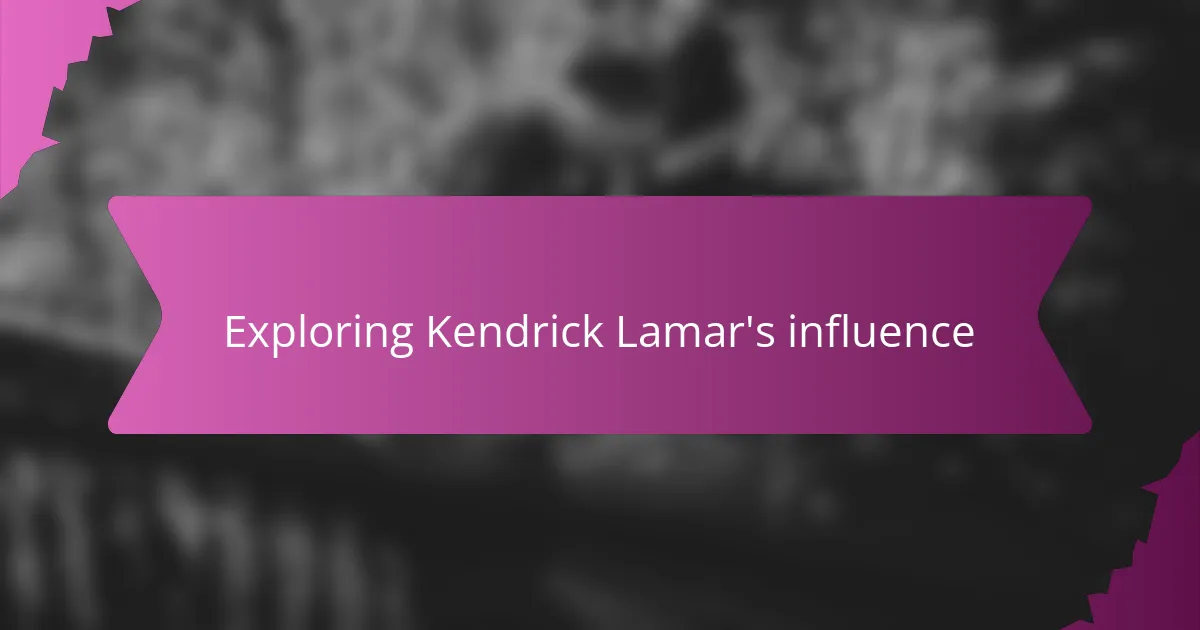
Exploring Kendrick Lamar’s influence
Kendrick Lamar’s influence on my journey with rap was profound because he brought a depth I hadn’t encountered before. His lyrics are like a mirror reflecting the realities of life, delivered with such sincerity and complexity that I found myself hanging on every word. Have you ever felt completely absorbed by a song that seems to tell your own story? That’s exactly what happened to me with Kendrick’s music.
What struck me most was how Kendrick blends storytelling with social commentary, making each track feel important and urgent. It wasn’t just entertainment—it was a wake-up call that challenged me to think about the world from perspectives I hadn’t considered. I remember listening to “Alright” and feeling a surge of hope even in the face of struggle, a feeling that stayed with me long after the song ended.
His ability to combine intricate wordplay with raw emotion taught me that rap could be both art and activism. That balance inspired me to explore rap beyond surface-level sounds and dig into its potential to influence thoughts and feelings. Have you ever discovered an artist who changes the way you listen to an entire genre? Kendrick was that for me, opening the door to a deeper connection with rap.

Discovering themes in Kendrick’s music
One of the first things I noticed when diving into Kendrick’s music was his fearless exploration of themes like identity, struggle, and resilience. Have you ever heard a song that feels like it’s peeling back layers of someone’s soul? That’s how I felt listening to tracks like “Sing About Me,” where he confronts mortality and legacy with such raw honesty that it left me reflecting on my own life.
Kendrick doesn’t shy away from heavy topics like systemic racism and mental health, but what really grabbed me was how he wove these themes into personal stories. It felt less like a lecture and more like a conversation between friends sharing their truths. When I listened to “The Blacker the Berry,” I was challenged to examine my own biases and the realities others face daily—a moment of uncomfortable growth that I needed.
What makes his thematic approach so powerful, in my experience, is the balance of vulnerability and hope. Even amid harsh realities, there’s often a thread of redemption or uplift that resonates deeply. I often ask myself, how can music carry such weight and still inspire? Kendrick’s answer lies in his ability to turn pain into poetry, making each theme not just understandable but profoundly relatable.
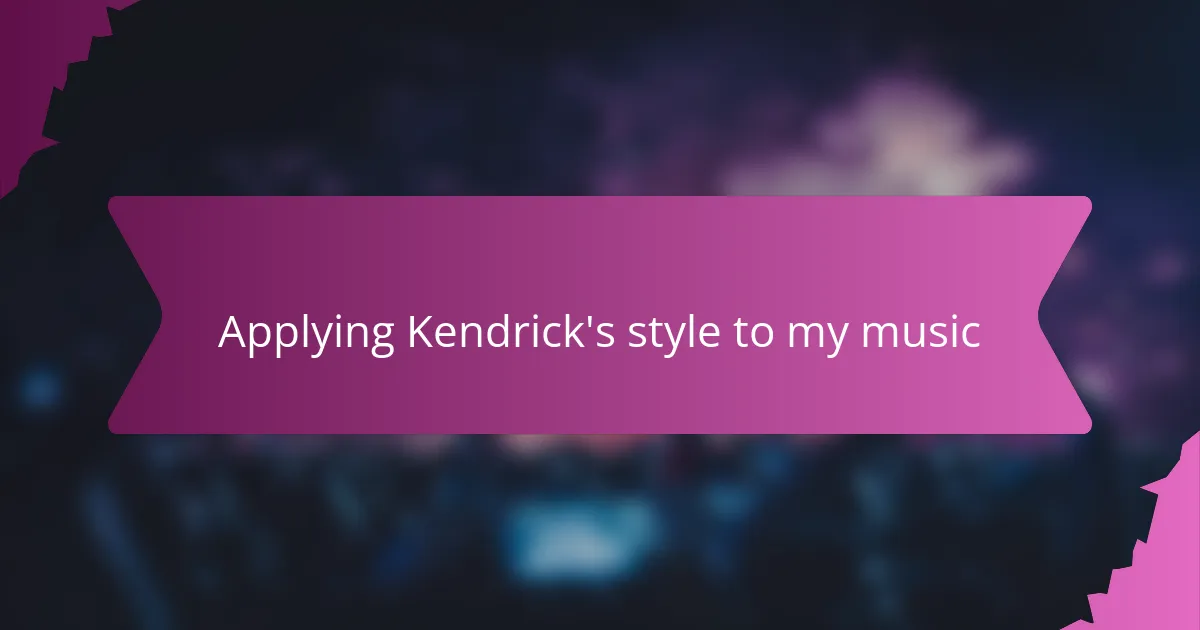
Applying Kendrick’s style to my music
Adopting Kendrick’s style pushed me to dig deeper into my own experiences and find the stories worth telling. I started experimenting with layering complex emotions over beats, much like he does, blending vulnerability with strength. Have you ever tried to put your own struggles into words that don’t just describe but truly connect? That challenge transformed the way I approached my music.
I also noticed how Kendrick’s flow shifts effortlessly between rapid-fire verses and smooth, melodic hooks, creating a dynamic energy that feels alive. Mimicking this taught me to play with rhythm and pacing, making my tracks less predictable and more engaging. It made me realize that flow is more than timing—it’s about mood and intention, which completely changed how I write.
Beyond technique, Kendrick’s fearless examination of personal and social issues encouraged me to be honest in my lyrics, even when it felt uncomfortable. I remember writing a song that confronted my own fears for the first time, inspired by his courage to speak out. Isn’t that what true artistry is about—pushing yourself to be real, no matter the risk? Kendrick’s style didn’t just influence my sound; it reshaped my purpose as an artist.
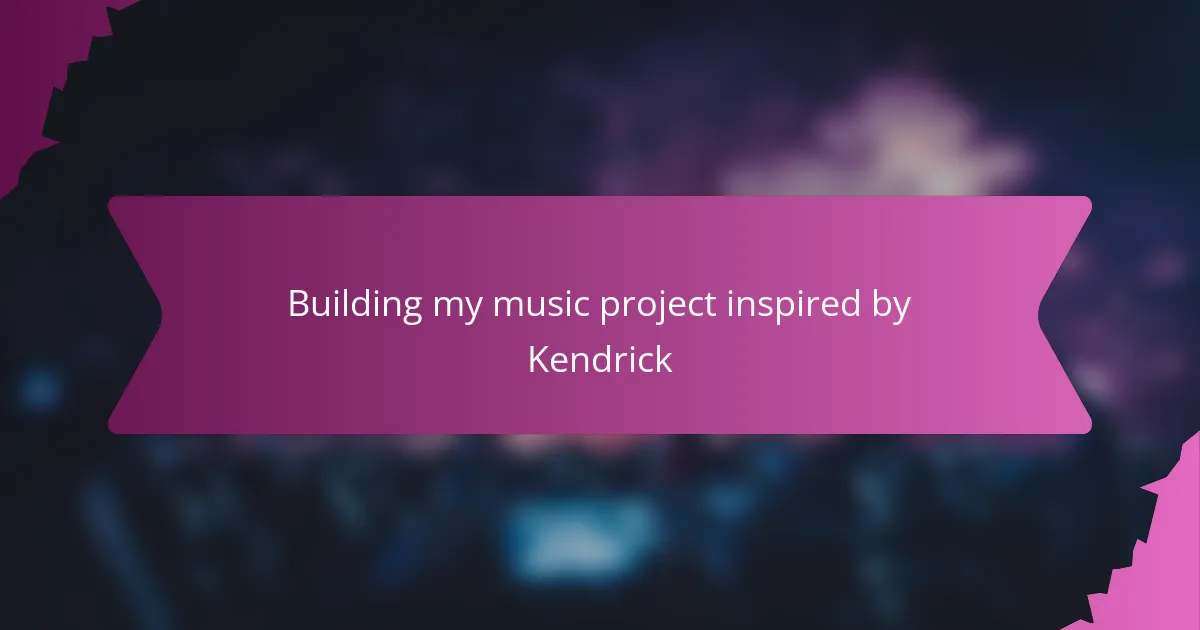
Building my music project inspired by Kendrick
Building my music project inspired by Kendrick felt like stepping into uncharted territory where honesty was my only map. I found myself writing late into the night, trying to capture moments of vulnerability that I’d usually keep hidden. Have you ever felt that mix of excitement and fear when sharing something deeply personal? That’s exactly what fueled my creativity during this phase.
One of the toughest but most rewarding parts was embracing complexity—both in the stories I told and the sounds I crafted. I started experimenting with unexpected beats and shifting flows, much like Kendrick’s unpredictable yet deliberate style. This wasn’t just about sounding cool; it was about creating a space where every lyric had weight and every pause said something meaningful.
I also realized that building this project meant more than music; it was about purpose. Writing songs that challenged me to confront my own biases and fears made the process raw and real. Did I worry about how others would react? Absolutely. But if Kendrick’s music taught me anything, it’s that art that comes from truth always finds its audience.
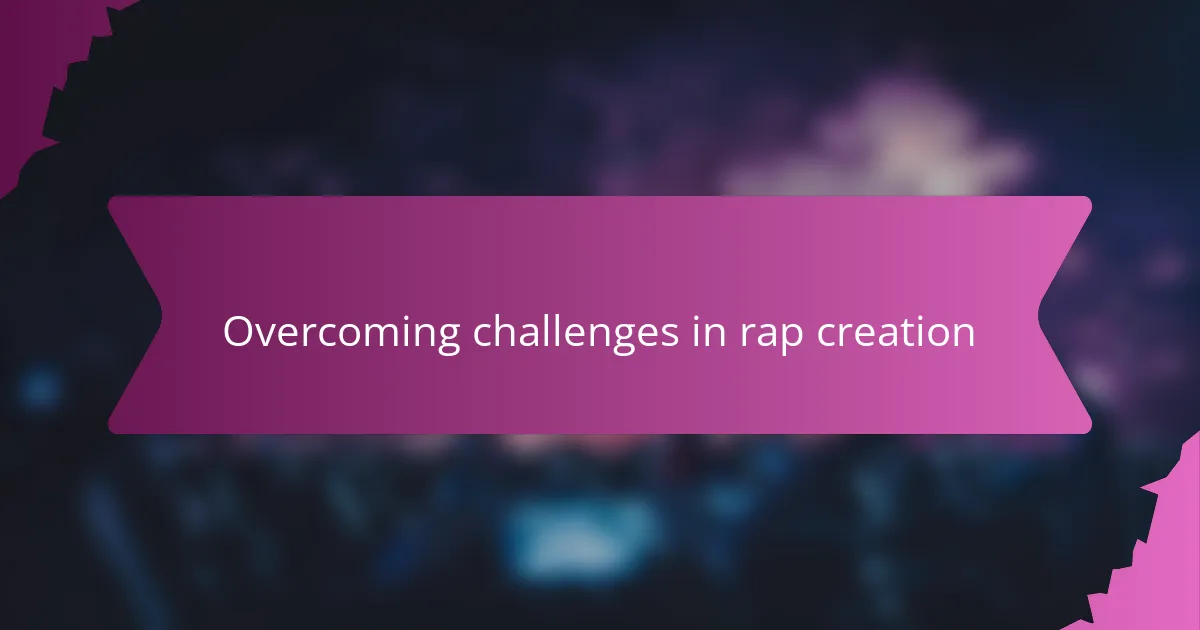
Overcoming challenges in rap creation
Overcoming challenges in rap creation often felt like trying to translate complex emotions into a language that rhymes and flows naturally. Have you ever struggled to find the right words that don’t just rhyme but actually mean something? I faced those moments repeatedly, where a line just wouldn’t land, and it pushed me to rethink my approach to writing and delivery.
One challenge I didn’t expect was balancing technical skill with genuine expression. In rap, it’s easy to get caught up in clever wordplay or fast flows, but what really matters is whether the message hits home. I remember sitting for hours, rewriting verses until they felt honest—sometimes raw enough to make me uncomfortable—but that vulnerability became my biggest strength.
Another hurdle was embracing my own voice instead of imitating others, even someone as influential as Kendrick. It was tempting to mimic his style exactly, but I realized that overcoming this meant trusting my perspective, flaws and all. Have you ever wondered when it’s time to move from inspiration to authenticity? That moment marked a turning point in my rap creation journey.
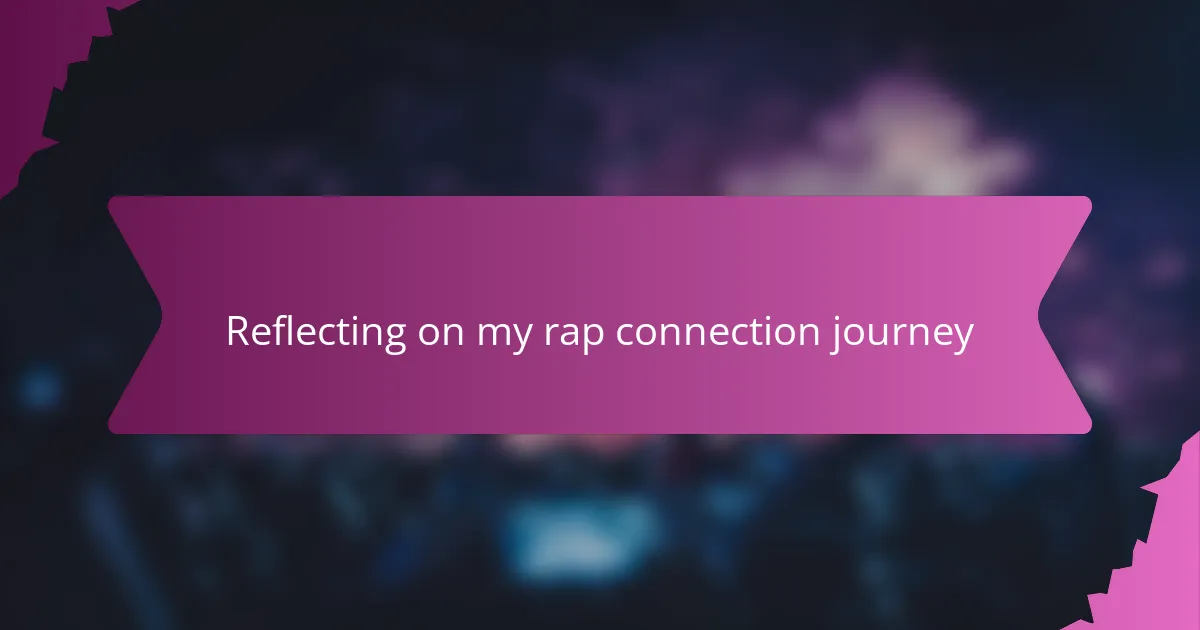
Reflecting on my rap connection journey
Looking back on my rap connection journey, I realize how much it was shaped by moments of both frustration and breakthrough. There were times when I felt stuck, wrestling with my own doubts about whether I could express myself authentically through this art form. Have you ever hit a creative wall that made you question why you started in the first place? For me, those moments eventually became turning points that deepened my commitment to rap.
I also see now how Kendrick’s influence helped me move past surface-level appreciation into something much more personal. His music challenged me not just to listen but to reflect on my life and the world around me. It was like holding up a mirror—I didn’t always like what I saw, but it pushed me to grow. That kind of self-examination is rare, and I’m grateful rap gave me a space for it.
Ultimately, this journey taught me that connecting with rap isn’t about perfection or fitting into a mold. It’s about embracing your own voice, with all its imperfections and complexities, and trusting that your story matters. Isn’t that what art is truly about—finding meaning in your own truth and sharing it with others? That realization made all the challenges worth it.